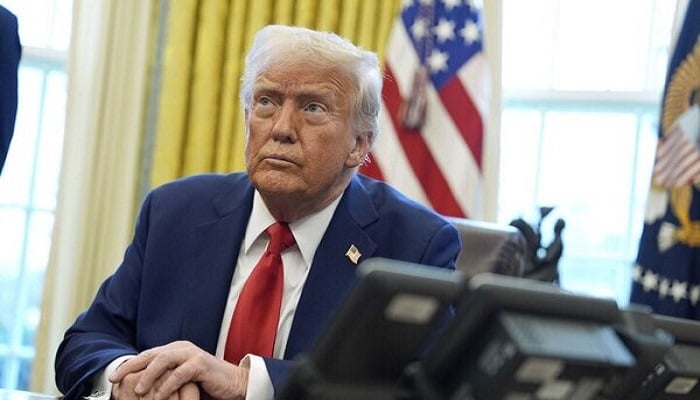PNN – The doctrine of “peace through strength” in the context of Trump’s policies has been implemented in a way that not only has not guaranteed peace, but has also caused further instability, humanitarian crises, and the destruction of international institutions.
The doctrine of “peace through strength” is one of the fundamental and enduring concepts of the world’s military and diplomatic policies, with its roots dating back to the Roman Empire. This phrase essentially means that in order to achieve peace and prevent war, it is necessary for a country to have a strong and superior military power to deter potential enemies and prevent a possible attack.
In history, Emperor Hadrian was among the first to put this concept into practice; he built Hadrian’s Wall and stationed large numbers of troops along the empire’s borders to protect the Roman Empire from attacks by northern tribes. In more modern times, this concept was used repeatedly by various leaders such as George Washington, Dwight Eisenhower, and Ronald Reagan, and became recognized as one of the pillars of American foreign policy. Reagan brought this doctrine to a peak during the Cold War with defense programs and increased military budgets to ensure security and stability through weapons superiority.
But in recent decades, especially with the rise to power of Donald Trump, this doctrine has taken on a new and more complex form that can be called “peace through aggressive military power” or, in other words, “peace through war.” Trump uses this concept in an aggressive manner, focusing on the use of force, widespread sanctions, and military threats, so that peace in its true sense, which is the result of diplomatic engagement and compromise, has fallen under the shadow of militarism and bullying.
Read more:
Americans blame Trump’s policies for worsening economic conditions.
The Historical Roots of the Doctrine of “Peace through Strength”
The famous slogan, “If you want peace, prepare for war,” was first used during the Roman Empire, indicating the importance of military preparedness to maintain security and prevent invasions. By building the Wall and strengthening the military, Emperor Hadrian demonstrated that a military presence at the borders could be a powerful deterrent to enemies. This idea later became the basis for the defense and military policies of many states, especially colonial powers, in the middle Ages and the modern era.
In the 20th century, the doctrine took on a more concrete form in American politics. During his presidency, Dwight Eisenhower introduced the concept as a strategy to counter the Soviet Union in the Cold War. He believed that deterrence through superior military power could prevent war and ensure national security. Ronald Reagan also greatly increased the defensive weapons program with the slogan “peace through strength” and believed that having superior military power would deter enemies from any aggressive action.
Trump’s Doctrine: From Deterrence to Aggression
Donald Trump is particularly fond of using the concept of “peace through strength” and has used it to justify his policies in numerous speeches, including in his speech to the Israeli Knesset, where he claimed that the Gaza peace agreement would never have been achieved if the US had not attacked Iran. This literature represents an approach in which the use of military power is considered as a tool to impose the will and submission of enemies.
During Trump’s second term, increasing the military budget and implementing maximum pressure policies against Iran and other US rivals formed the main part of this doctrine. Military strikes and assassinations of key figures, sweeping economic sanctions, and military threats have been used as the main tools to make US foreign policy increasingly aggressive. This approach has increased regional and international tensions and, instead of creating security, has brought new crises.
From the illusion of deterrence to the bitter realities
The first and most important criticism of the Trump doctrine is its transformation from a policy of deterrence to a policy of warmongering. Contrary to classical theories that consider strong military power as a means of maintaining peace, the experience of recent years has shown that increased militarism and frequent threats not only do not guarantee security, but also create an arms race, regional instability, and increased military violence.
The second major criticism is the huge military spending and the diversion of resources from vital social and economic issues. Huge military budgets come at the cost of reduced investment in education, health, and public welfare at home, which can lead to domestic discontent and the weakening of social structures. This is a reality seen in America and many Western countries today; huge military spending that not only does not bring peace, but also puts pressure on the domestic economy.
Third, there is serious damage to America’s credibility and declining role in the international system. Trump’s aggressive and unilateral policies, especially repeated sanctions and threats, have reduced international cooperation and weakened multilateral institutions such as the United Nations. These policies have caused many of America’s traditional allies to doubt the country’s commitments and honesty, and some have moved toward more independent cooperation or closer ties with America’s rivals.
The fourth criticism is the humanitarian and moral crises that this doctrine has brought about. Airstrikes in Yemen, assassinations of personalities, and increased military violence in the region are clear examples of this. These actions have killed and injured thousands of civilians and have solidified the image of the United States as a country that does not respect human rights and international law.
Fifth, this doctrine is based on a kind of extreme nationalism and even racism that Trump and his political movement follow. This attitude, which presents America as a “superior nation” and “white Christian,” has weakened internal cohesion and created deep social divisions, and has also fueled racial and cultural tensions in foreign policy.

